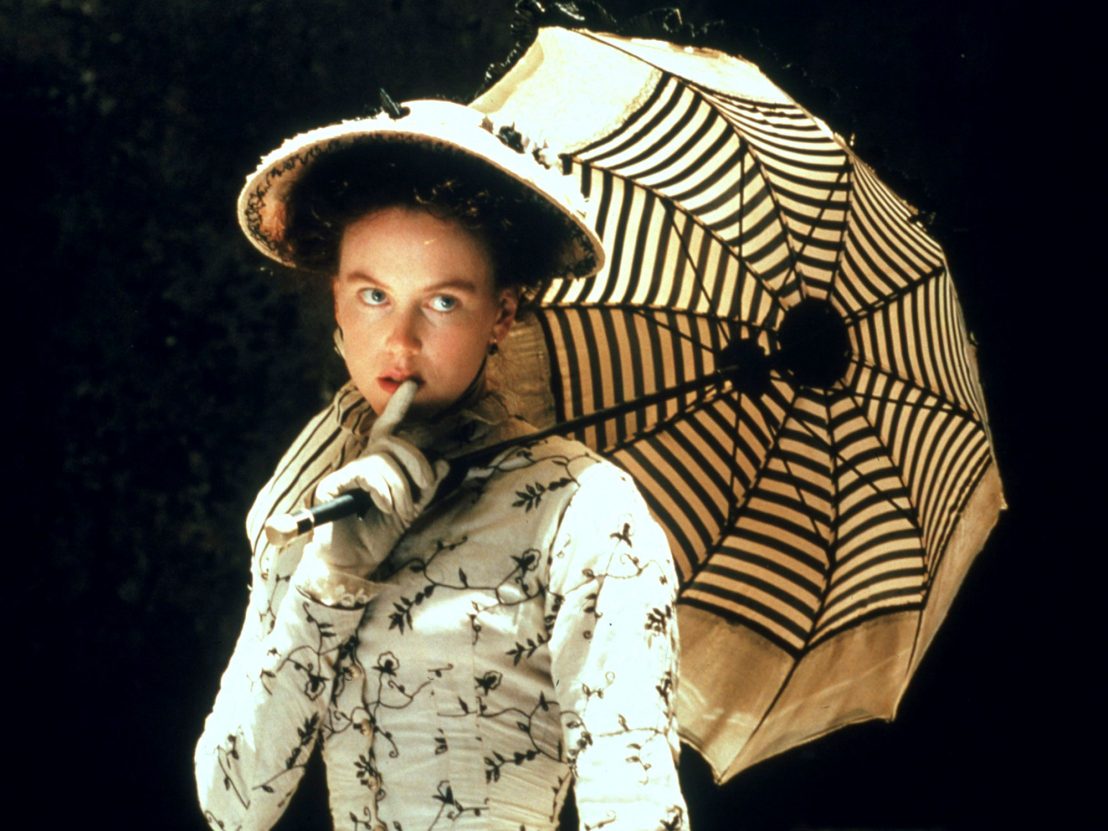
Following the award-winning, ground-breaking triumph of 1993’s The Piano, hopes couldn’t have been higher for Jane Campion’s follow-up. Based on Henry James’ most beloved novel, The Portrait of a Lady seemed on paper like a critical slam dunk. Yet the film was widely dismissed upon its release, with contemporary reviews describing it as “pretentious,” “slow,” and “exasperating”. It was a commercial failure, too, losing money at the box office.
Adapted by Laura Jones, who previously wrote the screenplay for Campion’s An Angel at My Table in 1990, The Portrait of a Lady is a fascinating outlier in the historical dramas of ’90s Hollywood. The corsets and longing glances are all there, but Campion imbues her film with anachronistic twists and narrative shifts that apparently upset the James purists. His dense prose and carefully layered critique of American exceptionalism were remoulded by the director to suit her own thematic concerns, as well as her keen eye for sensuality.
The film’s title could easily describe Campion’s entire filmography – stories of women who battle patriarchal boundaries and fight to fulfil their desires, be they sexual (In the Cut), artistic (The Piano), or spiritual (Holy Smoke). Campion crafts narratives centred on brilliant women who are plunged into experiences that force them to second-guess their own identity.
Nicole Kidman’s Isabel Archer, a fiercely driven but naive heiress who finds herself trapped in a loveless marriage, is cut from the same cloth as the Campion heroines who preceded and followed in her footsteps – the key difference being that Isabel does not achieve it; her freedom is outright denied.
“Like many of Campion’s heroines, Isabel’s nerve and a headful of ideas makes her vulnerable to manipulation by ill-meaning men.”
Isabel challenges society’s narrow expectations by turning down marriage proposals from a string of perfectly acceptable suitors. Then, coaxed by her supposed friend, the ruthless Madame Merle (Barbara Hershey), she falls head-over-heels in love with Gilbert Osmond (John Malkovich), a callous art collector who drops his romantic facade the moment they are wed. Kidman visibly wilts as the narrative unfolds, capturing Isabel’s transformation into the kind of miserable, trapped wife she had always feared.
Like many of Campion’s heroines, her nerve and a headful of ideas makes her vulnerable to manipulation by ill-meaning men. The Piano’s Ada McGrath (Holly Hunter) is punished for her sins with the removal of a finger – an act of artistic castration – while Holy Smoke’s Ruth Barron (Kate Winslet) is denied her religious awakening by her ignorant family, who hire a deprogrammer to “set her right”. In the end, however, these women are given a shot at redemption and a return to freedom. Isabel is not. She doesn’t triumph over sexism or gain revenge on those who wronged her. Her life just sort of fizzles out.
As in the novel, the exact direction Isabel will take is ambiguous – will she return to Osmond to protect his abused daughter, or give up everything to be free? – but for Campion, her sadness seems assured. She is not dead but something close to it. Even Madame Merle, who facilitated Isabel’s marriage, admits, “I know you are very unhappy, but I more so.” There’s no retribution for any of the women here.
The Portrait of a Lady is also notable for the ways Campion and Jones re-envision James’ novel: Isabel’s worldwide travels, which take up a large part of the book, are distilled into a silent film full of jerky, sped-up motion; while considering her options, she fantasises about her three main suitors taking her to bed at the same time, a bold display of her pre-marital autonomy; the film opens with young female voices discussing the meaning of love before the credits play out over a group of thoroughly modern women frolicking in an idyllic green.
This urgent interpretation of a deeply introspective tale exemplifies Campion’s devotion to showing women’s experiences and struggles across all eras. Women’s stories, alas, remain much the same across the centuries – but the dissection of them should be as fierce and determined as the heroines at their centre.
Published 16 Nov 2021

Jane Campion’s much maligned 2003 thriller offers a vital subversion of the male gaze.

Jane Campion’s claustrophobic, slow-burn western dials up the queer subtext of Thomas Savage’s source novel.

Benedict Cumberbatch is the perfect fit for the director’s upcoming neo-western, The Power of the Dog.